RESEARCH
From other Websites
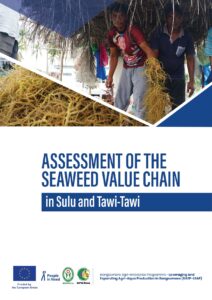
ASSESSMENT OF THE SEAWEED VALUE CHAIN IN SULU AND TAWI-TAWI
Authored by Elsie S. Villanueva, with contributions by Judith Joy G. Libarnes and Ahmed Harris R. Pangcoga, this study is part of the Leveraging and Expanding Agri-Aqua Production (LEAP) in Bangsamoro project funded by the European Union as part of the Bangsamoro AgriEnterprise Programme. It is also part of an extensive internal assessment and in-depth interviews carried out by People in Need (PIN) and the partners in mainland BARMM and the island provinces. This will eventually contribute to the systemic development of the seaweed value chains (VC) in the region. The evaluation found deficiencies in the areas of financial services, support for product quality, and access to nurseries and multipurpose processing facilities. Requirements were also identified, including maximizing intercropping opportunities, and enhancing the participation of women, indigenous people, and young people in the value chains.
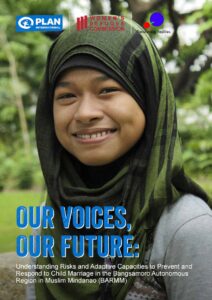
Understanding Risks and Adaptive Capacities to Prevent and Respond to Child Marriage in the Bangsamoro Autonomous Region in Muslim Mindanao (BARMM)
FULL REPORT
Co-authored by Ahmed Harris R. Pangcoga, with contributions by Jovar G. Pantao, Lolymar S. Jacinto-Reyes, and Judy Ann A. Lubiano-Balabagan, this study, commissioned by Plan International and WRC and implemented by Transforming Fragilities, aimed to understand the risks, drivers, and consequences of child marriage among adolescent girls in four conflict- and disaster-affected provinces in BARMM: Maguindanao, Lanao del Sur, Basilan, and Sulu. Due to underreporting and lack of registration, the true prevalence of child marriage in the region remains unclear. While national data suggests earlier marriage in BARMM than the rest of the Philippines, systematic data is lacking. Girls face increased risks due to conflict and displacement, including violence, sexual harassment, and heightened vulnerability to early and forced marriage.

Understanding Risks and Adaptive Capacities to Prevent and Respond to Child Marriage in the Bangsamoro Autonomous Region in Muslim Mindanao (BARMM)
EXECUTIVE SUMMARY
Co-authored by Ahmed Harris R. Pangcoga, with contributions from Jovar G. Pantao, Lolymar S. Jacinto-Reyes, and Judy Ann A. Lubiano-Balabagan, this study, commissioned by Plan International and WRC and implemented by Transforming Fragilities, aimed to understand the risks, drivers, and consequences of child marriage among adolescent girls in four conflict- and disaster-affected provinces in BARMM: Maguindanao, Lanao del Sur, Basilan, and Sulu. Due to underreporting and lack of registration, the true prevalence of child marriage in the region remains unclear. While national data suggests earlier marriage in BARMM than the rest of the Philippines, systematic data is lacking. Girls face increased risks due to conflict and displacement, including violence, sexual harassment, and heightened vulnerability to early and forced marriage.
On this Website
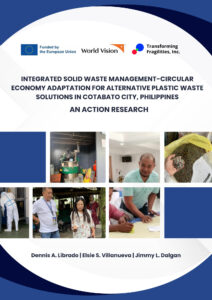
Integrated Solid Waste Management-Circular Economy Adaptation for Alternative Plastic Waste Solutions in Cotabato City, Philippines
Authored by Elsie Villanueva, Jimmy Dalgan, and Dennis Librado, this study, co-implemented by Transforming Fragilities, Inc. and World Vision Development Foundation, Inc. (WVDFI) with funding from the European Union, examines solid waste management (SWM) in Cotabato City and the integration of circular economy (CE) practices under RA 9003. Despite the law’s passage more than two decades ago, waste management challenges persist nationwide, and Cotabato City faces added constraints as 70% of its area lies below sea level, limiting disposal options. The project underscores the role of local CSOs in advancing CE initiatives and reaching marginalized communities in the BARMM context. The study aims to assess SWM implementation in Cotabato City, document community practices, identify priority concerns, and benchmark against model LGUs in SOCCSKSARGEN (General Santos City, Kidapawan City, and Surallah).
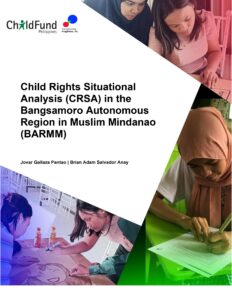
Child Rights Situational Analysis (CRSA) in Bangsamoro Autonomous Region in Muslim Mindanao (BARMM)
Authored by Jovar G. Pantao and Brian Adam S. Anay, this Child Rights Situation Analysis (CRSA) in the Bangsamoro Autonomous Region in Muslim Mindanao (BARMM) was conducted by Transforming Fragilities, Inc. (TFI) for ChildFund Philippines. The study provides a comprehensive assessment of the situation of children in BARMM across the four child rights domains of survival, development, protection, and participation. It examines the structural, systemic, and socio political factors influencing child rights realization within the region’s distinct context. The CRSA aims to generate evidence to inform ChildFund Philippines’ advocacy, programming, and policy initiatives toward advancing and safeguarding the rights and well being of children in BARMM.
Published Work of TFI Experts
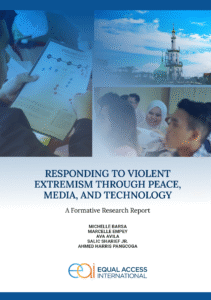
Formative Research on Responding to Violent Extremism through Peace, Media, and Technology
Co-authored by Ahmed Harris R. Pangcoga, this research was commissioned by Equal Access International. It aims to assess existing VE influencers and networks, define target audiences, including their demographics and methods of communication, understand their desires and pathways toward radicalization and empowerment, and characterize vulnerable populations. The research focused on identifying target vulnerable populations in the Autonomous Region of Muslim Mindanao (ARMM) and key urban areas. The research identified and analyzed several recurring and intersecting themes relevant to countering violent extremism (CVE) efforts. The research found that there is a presence of recruiters for VE groups in their communities and schools, but there is no singular profile of individuals targeted for recruitment.
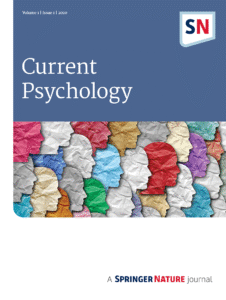
Psychological distress and perceived threat serially mediate the relationship between exposure to violence and political exclusionist attitude
Co-authored by Johnson K. Badawi and published in the journal Current Psychology, a publication by Springer Nature Link, this study investigates the psychological mechanisms behind the formation of political exclusionist attitudes in children and adolescents who have been exposed to violence. It posits that this relationship is not direct but rather a chain of events where psychological distress and perceived threat act as serial mediators. The research’s findings provide evidence for the validity of the stress-based model of political extremism in the context of Filipino youth. This has significant implications for creating age-appropriate peace education interventions. The study suggests that focusing on reducing distress and managing threat perception could be effective in preventing the development of exclusionary political attitudes among young people in conflict-affected regions.
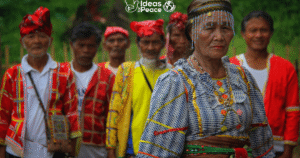
The Human Security of Indigenous People in Mindanao: Challenges and Prospects
Authored by Johnson K. Badawi and published in the journal EBSCO, this study explores the difficulties faced by the Indigenous Peoples (IPs), or Lumads, in Mindanao, Philippines, within a people-centered human security framework. It details the challenges to their freedoms from fear, want, and living with dignity, which are exacerbated by conflicts between the government and armed groups. These conflicts have resulted in red-tagging, human rights violations, and displacement. The study also highlights issues of land-grabbing, inadequate social services, poor health, and educational disparities, which are all compounded by discrimination.
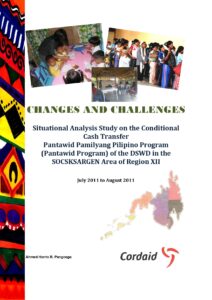
CHANGES AND CHALLENGES: SITUATIONAL ANALYSIS STUDY ON THE CONDITIONAL CASH TRANSFER PANTAWID PAMILYANG PILIPINO PROGRAM (PANTAWID PROGRAM) OF THE DSWD IN THE SOCSKSARGEN AREA OF REGION XII.
FULL DOCUMENT
Authored by Ahmed Harris R. Pangcoga, this study, initiated by Cordaid, aimed to highlight the importance of proper implementation and improved access to cash transfer and social safety net programs. Focusing on the Pantawid Pamilyang Pilipino Program (4Ps) in the SOCSKSARGEN area of Region XII, it may be one of the first efforts to analyze the program’s local execution, short-term impacts on beneficiaries, and community-level outcomes. It identifies implementation challenges and suggests areas for improvement, complementation, and convergence, particularly for NGOs working alongside DSWD. The study also reflects insights from both implementers and beneficiaries, emphasizing that community empowerment must remain central to social protection efforts.

Situational Analysis Study on the Conditional Cash Transfer Pantawid Pamilyang Pilipino Program (Pantawid Program) of the DSWD in the SOCSKSARGEN Area of Region XII
MAGAZINE VERSION
Authored by Ahmed Harris R. Pangcoga, this study, initiated by Cordaid, aimed to highlight the importance of proper implementation and improved access to cash transfer and social safety net programs. This study may be one of the first efforts to analyze the local execution of the Pantawid Pamilyang Pilipino Program (4Ps) in the SOCSKSARGEN area of Region XII, along with its short-term impacts on beneficiaries and community-level outcomes. It identifies implementation challenges and suggests areas for improvement, complementation, and convergence, particularly for NGOs working alongside DSWD. The study also reflects insights from both implementers and beneficiaries, emphasizing that community empowerment must remain central to social protection efforts
